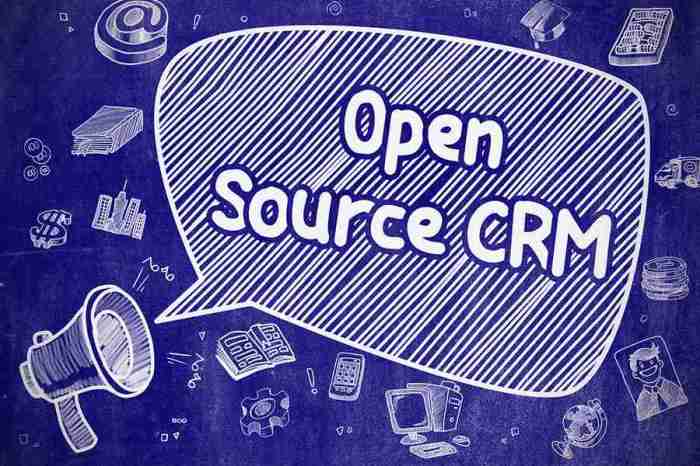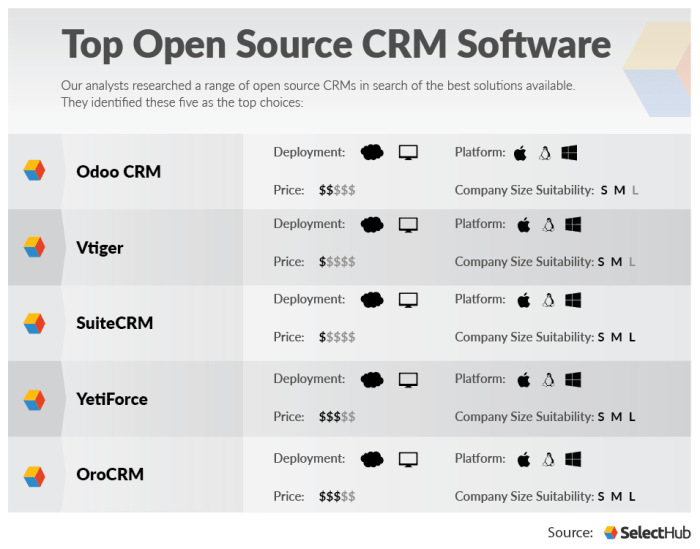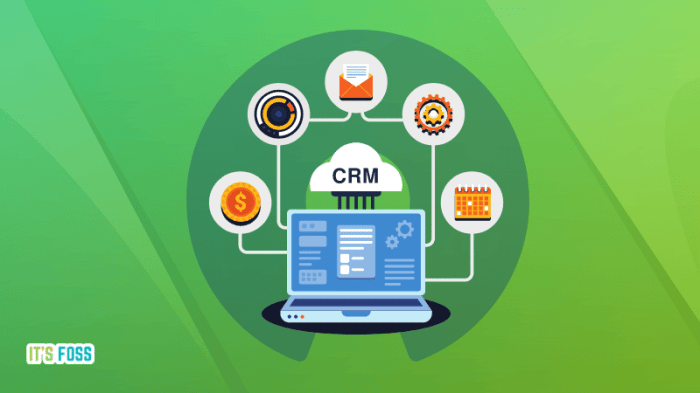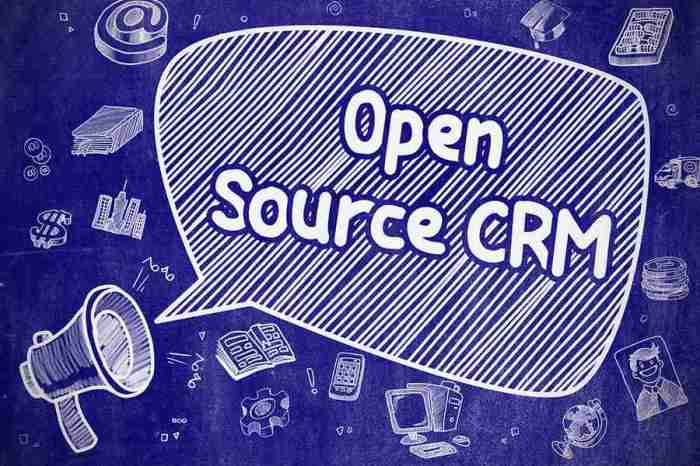
Best Open Source CRM: Empower Your Business with Free Solutions
Best open source CRM takes center stage, offering a compelling alternative to traditional, paid CRM solutions. By embracing the power of open-source software, businesses can access robust CRM functionalities without hefty licensing fees. This opens doors to greater flexibility, customization, and control over your customer data.
Imagine a CRM platform that aligns perfectly with your unique business needs, allowing you to tailor features, integrations, and workflows to your exact specifications. That’s the beauty of open-source CRM. It empowers you to build a solution that truly reflects your vision, without the limitations imposed by proprietary software.
What is an Open Source CRM?

Open-source CRM is a powerful tool for businesses of all sizes. It offers a flexible and customizable solution that can be adapted to meet specific business needs. This article will explore the concept of open-source CRM, delve into its benefits, and provide examples of popular platforms.
Definition and Relevance
Open-source software is software whose source code is publicly available and can be freely used, modified, and distributed. In the context of CRM, open-source solutions allow businesses to access and modify the underlying code of their CRM system. This gives them greater control over their data, functionality, and integration with other systems.
Benefits of Open-Source CRM
Open-source CRM offers numerous advantages over traditional, proprietary CRM systems.
Flexibility and Customization
Open-source CRM systems are highly customizable. Businesses can modify the code to tailor the system to their specific requirements, such as adding new features, integrating with existing systems, or creating custom workflows. This flexibility ensures that the CRM solution perfectly aligns with the company’s unique processes and needs.
Cost-Effectiveness
Open-source CRM solutions are often free to use, although some platforms offer paid support or premium features. This cost-effectiveness makes them particularly attractive for small and medium-sized businesses with limited budgets. Additionally, the open-source model allows for the development and deployment of custom solutions without the high licensing fees associated with proprietary systems.
Transparency and Security
The open-source nature of CRM systems fosters transparency and security. The code is publicly available, allowing developers and security experts to scrutinize it for vulnerabilities and potential risks. This collaborative approach helps to improve the overall security and stability of the system.
Community Support
Open-source CRM platforms benefit from a large and active community of developers, users, and experts. This community provides support, resources, and a wealth of knowledge, enabling businesses to troubleshoot issues, access best practices, and collaborate on improvements.
Popular Open-Source CRM Platforms
The open-source CRM market offers a wide range of platforms, each with its unique features and strengths. Some popular examples include:
- SugarCRM:A comprehensive platform that offers a wide range of features, including sales automation, marketing automation, and customer support. SugarCRM is known for its flexibility and scalability, making it suitable for businesses of all sizes.
- SuiteCRM:A fork of SugarCRM that focuses on providing a user-friendly and feature-rich CRM solution. SuiteCRM offers a strong focus on collaboration and communication, making it ideal for teams working together.
- Dolibarr ERP/CRM:A comprehensive platform that combines ERP (Enterprise Resource Planning) and CRM functionality. Dolibarr offers a wide range of features for managing business operations, including accounting, inventory, and project management.
- Vtiger CRM:A popular platform known for its intuitive interface and strong focus on sales automation. Vtiger CRM offers features such as lead management, opportunity tracking, and sales forecasting.
- Odoo:A comprehensive suite of business applications that includes a robust CRM module. Odoo offers a wide range of features for managing various aspects of a business, including sales, marketing, inventory, and accounting.
Key Features of Best Open Source CRMs
Open-source CRMs offer a powerful suite of features to manage customer relationships, track leads, and automate sales processes. While specific features may vary depending on the chosen platform, some core functionalities are common across most open-source CRM solutions.
Contact Management
Contact management is the foundation of any CRM system. Open-source CRMs provide robust tools to organize and manage customer information.
- Centralized Database:Open-source CRMs centralize all customer data in a single database, providing a comprehensive view of each contact. This includes contact details, communication history, purchase records, and other relevant information.
- Detailed Profiles:Detailed customer profiles capture a wide range of information, including contact information, demographics, purchase history, and interaction logs. This allows businesses to segment customers based on specific criteria, personalize communications, and tailor marketing campaigns.
- Customizable Fields:Open-source CRMs offer customizable fields to accommodate specific business requirements. This allows businesses to capture unique data points relevant to their industry or operations, enhancing the value of customer profiles.
Lead Tracking
Effective lead tracking is crucial for nurturing potential customers and converting them into paying clients. Open-source CRMs offer a range of tools to manage leads efficiently.
- Lead Capture Forms:Open-source CRMs provide customizable lead capture forms to collect contact information from website visitors, social media, or other sources. These forms can be integrated with various marketing channels to streamline the lead generation process.
- Lead Scoring:Lead scoring systems automatically assign points to leads based on their behavior and engagement, helping sales teams prioritize high-potential prospects. This allows businesses to focus their efforts on leads most likely to convert.
- Lead Nurturing:Open-source CRMs enable automated lead nurturing campaigns, sending personalized emails, content, and offers to guide leads through the sales funnel. This helps build relationships, educate prospects, and move them closer to a purchase decision.
Sales Automation
Sales automation tools streamline repetitive tasks, freeing up sales teams to focus on building relationships and closing deals. Open-source CRMs offer a range of automation features.
- Automated Email Sequences:Automated email sequences can be set up to send personalized emails to leads and customers at specific intervals, nurturing relationships and driving conversions.
- Task Management:Task management tools allow sales teams to assign, track, and manage tasks related to specific leads or opportunities. This ensures that no sales activity falls through the cracks.
- Sales Pipeline Management:Open-source CRMs provide visual representations of the sales pipeline, allowing teams to track progress, identify bottlenecks, and optimize sales processes.
Reporting and Analytics
Data-driven insights are essential for making informed business decisions. Open-source CRMs provide powerful reporting and analytics capabilities.
- Customizable Reports:Open-source CRMs offer customizable reports to analyze key metrics, such as lead conversion rates, customer lifetime value, and sales performance. This allows businesses to identify trends, measure the effectiveness of their sales strategies, and make data-driven improvements.
- Dashboards:Dashboards provide a visual overview of key performance indicators (KPIs), allowing teams to quickly assess the health of their sales operations. This facilitates proactive decision-making and enables teams to stay on top of critical metrics.
- Real-Time Data:Open-source CRMs often provide real-time data, enabling businesses to track progress and make adjustments as needed. This helps ensure that sales teams have access to the most up-to-date information and can make informed decisions based on the latest data.
Choosing the Right Open Source CRM

Choosing the right open-source CRM can be a daunting task, as there are numerous options available, each with its own set of features, pricing, and support options. It’s essential to consider your specific needs and requirements to make an informed decision.
Factors to Consider When Choosing an Open Source CRM
When selecting an open-source CRM, several crucial factors should be carefully evaluated to ensure the chosen solution aligns with your business needs and objectives. These factors encompass pricing, scalability, integration capabilities, and support options.
- Pricing: Open-source CRMs offer a wide range of pricing models, from free and open-source solutions to paid options with premium features and support. It’s crucial to assess your budget and determine the level of investment you’re willing to make.
Finding the best open source CRM can be a bit like finding your tribe. You want a system that aligns with your values and goals, just like the saying birds of a feather flock together suggests. Open source CRMs offer flexibility and community support, making it easier to find a solution that truly fits your business needs and allows you to connect with like-minded users for shared knowledge and collaboration.
Some solutions might require upfront costs for installation and customization, while others offer subscription-based pricing models.
- Scalability: As your business grows, your CRM needs to adapt accordingly. Consider the scalability of the chosen open-source CRM solution to accommodate increasing data volumes, user numbers, and workload demands. Ensure the platform can handle future growth without compromising performance or stability.
- Integration Capabilities: Seamless integration with other business systems is essential for a streamlined workflow. Evaluate the integration capabilities of the open-source CRM, including its ability to connect with existing tools such as email marketing platforms, accounting software, and marketing automation systems.
- Support Options: Open-source CRMs often come with varying levels of support. While some offer comprehensive support packages, others rely on community forums and online resources. It’s crucial to assess the available support options and determine the level of assistance you require.
Best Practices for Evaluating and Comparing Open Source CRM Solutions
To effectively evaluate and compare different open-source CRM solutions, adopt a structured approach that involves several key steps. This process will help you narrow down your choices and identify the best fit for your business.
- Define Your Requirements: Start by clearly defining your specific CRM needs. Identify the key features and functionalities you require, considering factors such as contact management, lead nurturing, sales pipeline management, reporting, and analytics.
- Research and Shortlist: Conduct thorough research to identify potential open-source CRM solutions that align with your requirements. Explore reputable online resources, read reviews, and gather information about the features, pricing, and support options offered by each platform.
- Trial and Evaluation: Many open-source CRM providers offer free trials or demo versions. Take advantage of these opportunities to test the platforms firsthand, explore their features, and assess their usability and ease of implementation.
- Community Engagement: Engage with the open-source community to gain insights from experienced users. Visit forums, online groups, and social media platforms to gather feedback and learn about the pros and cons of different solutions.
- Cost-Benefit Analysis: Compare the pricing models, features, and support options of shortlisted solutions. Conduct a cost-benefit analysis to determine the most value for your investment.
Comparison of Top Open Source CRM Platforms
The table below compares some of the top open-source CRM platforms based on their features, pricing, and user reviews. This comparison will help you understand the strengths and weaknesses of each solution and make an informed decision.
| Platform | Features | Pricing | User Reviews |
|---|---|---|---|
| SuiteCRM | Comprehensive CRM features, including sales automation, marketing automation, and customer service tools. | Free and open-source, with paid support options. | Generally positive reviews, praising its features and flexibility. |
| Dolibarr ERP CRM | Combines ERP and CRM functionalities, offering features for project management, accounting, and inventory management. | Free and open-source, with paid support options. | Mixed reviews, with some users appreciating its comprehensive features and others finding it complex to configure. |
| vtiger CRM | Focused on sales and marketing automation, offering features for lead management, opportunity tracking, and campaign management. | Free and open-source, with paid editions for advanced features. | Positive reviews, highlighting its ease of use and powerful automation capabilities. |
| Odoo | A comprehensive suite of business applications, including CRM, ERP, and e-commerce functionalities. | Free and open-source, with paid editions for advanced features. | Mixed reviews, with some users praising its versatility and others finding it overwhelming. |
Implementation and Customization

Implementing an open-source CRM can seem daunting at first, but with the right approach and understanding of your business needs, it can be a smooth and rewarding process. The implementation process involves several steps, from installation and configuration to data migration and customization.
Open-source CRMs offer a high degree of flexibility, allowing you to tailor them to your specific business requirements.
Installation and Configuration
The first step in implementing an open-source CRM is installing the software. Most open-source CRMs are available as downloadable packages or can be installed using a web-based installer. The installation process typically involves setting up a database, configuring the CRM’s settings, and creating user accounts.
The installation guide provided by the CRM vendor will guide you through the process. Once installed, you need to configure the CRM to match your business processes. This includes setting up custom fields, defining workflows, and integrating with other business applications.
Configuration options will vary depending on the specific CRM you choose, but most platforms provide a user-friendly interface for managing these settings.
Choosing the best open source CRM can feel like picking the perfect spring lip color – you want something that complements your brand, stands out, and lasts. While I’m busy trying out the new happy spring new lip colors from Trish McEvoy , I’m also considering a few open source CRM options for my business.
Ultimately, the right CRM should be as vibrant and versatile as a bold new lipstick shade!
Data Migration
After installing and configuring the CRM, you’ll need to migrate your existing customer data from your current system. This can be a complex process, especially if you have a large amount of data or use multiple systems. To make the migration process smoother, it’s essential to plan and test it thoroughly.You can use a variety of methods to migrate data, including manual entry, importing from CSV files, or using data migration tools.
If you have a complex data structure, consider using a dedicated data migration tool that can handle large data volumes and ensure data integrity.
Customization Options
Open-source CRMs offer extensive customization options that allow you to tailor the platform to your specific business needs. These customization options can be categorized into:
Workflow Automation
Workflow automation allows you to automate repetitive tasks and processes, such as sending email notifications, updating customer records, and generating reports. Open-source CRMs often come with built-in workflow automation features, but you can also use third-party plugins or custom code to extend these capabilities.
Custom Fields
Custom fields allow you to add additional data fields to your CRM records. This can be helpful for storing information that’s specific to your business, such as customer preferences, product details, or sales opportunities.
Integrations
Open-source CRMs can be integrated with other business applications, such as email marketing platforms, accounting software, and social media tools. This integration allows you to streamline your business processes and access data from different systems in a central location.
Finding the best open source CRM can be a daunting task, especially when you’re bombarded with endless options. It’s like trying to find the perfect Beetlejuice Beetlejuice Beetlejuice costume – you want something unique, functional, and a little bit spooky.
Ultimately, the best CRM for you will depend on your specific needs and budget, so take your time, do your research, and don’t be afraid to get creative.
Customizing Your Open-Source CRM
Here’s a step-by-step guide for customizing your open-source CRM to meet your specific business needs:
1. Identify Your Requirements
Begin by identifying your specific business needs and how the CRM can help you achieve your goals. This might include improving customer service, automating marketing campaigns, or tracking sales performance.
2. Explore Customization Options
Once you have a clear understanding of your requirements, explore the customization options available in your chosen CRM platform. This includes reviewing the documentation, exploring the available plugins and extensions, and consulting with the community for best practices.
3. Develop a Customization Plan
Based on your requirements and the available customization options, develop a plan for customizing your CRM. This plan should Artikel the specific features you want to add or modify, the tools you’ll use, and the timeline for implementation.
4. Implement the Customization
Implement the customization plan by adding custom fields, creating workflows, and integrating with other applications. Use the CRM’s built-in tools or third-party plugins to achieve the desired results.
5. Test and Deploy
Thoroughly test the customizations to ensure they work as expected and don’t interfere with other CRM functionality. Once you’re satisfied with the results, deploy the customizations to your production environment.By following these steps, you can customize your open-source CRM to meet your specific business needs and gain a competitive advantage.
Open Source CRM Community and Support
One of the most significant advantages of choosing an open-source CRM is the vibrant and supportive community that surrounds it. This community acts as a valuable resource for users, developers, and businesses, fostering collaboration, knowledge sharing, and problem-solving.
Open Source CRM Community Benefits
The open-source community offers a wealth of benefits for CRM users:
- Access to a Collective Knowledge Base:The community serves as a central repository of information, providing users with access to a vast pool of knowledge, best practices, and solutions to common challenges.
- Collaboration and Support:Users can connect with other users, developers, and experts to discuss issues, seek advice, and collaborate on solutions. This collaborative environment ensures that users are not alone in their CRM journey.
- Faster Problem Resolution:The collective knowledge and experience within the community often lead to faster resolution of issues, as users can leverage the combined expertise of others.
- Continuous Improvement:The open-source model encourages continuous improvement and innovation. Users can contribute to the development of the CRM by reporting bugs, suggesting enhancements, and contributing code.
Support Channels, Best open source crm
Open-source CRM platforms offer a variety of support channels to cater to the diverse needs of their users. These channels provide a platform for users to connect with the community and seek assistance:
- Forums:Online forums dedicated to specific CRM platforms are popular channels for users to post questions, share experiences, and find solutions from other users and developers.
- Documentation:Comprehensive documentation, including user guides, API documentation, and tutorials, provides users with detailed information about the CRM’s features and functionalities.
- Developer Communities:For developers, dedicated communities provide a platform to share code, discuss technical issues, and collaborate on projects. These communities are crucial for extending and customizing CRM functionalities.
- Issue Trackers:Open-source CRM platforms typically use issue trackers to manage bug reports, feature requests, and other issues. Users can contribute to the development process by reporting issues and tracking their progress.
- Paid Support Options:Some open-source CRM providers offer paid support packages that provide users with priority access to expert assistance and dedicated support services.
Support Options for Popular Open Source CRM Platforms
The following table provides an overview of the support options offered by some popular open-source CRM platforms:
| CRM Platform | Forums | Documentation | Developer Community | Issue Tracker | Paid Support |
|---|---|---|---|---|---|
| SuiteCRM | Yes | Yes | Yes | Yes | Yes |
| Dolibarr ERP CRM | Yes | Yes | Yes | Yes | Yes |
| vtiger CRM | Yes | Yes | Yes | Yes | Yes |
| Odoo | Yes | Yes | Yes | Yes | Yes |
| CRM-Open | Yes | Yes | Yes | Yes | No |
Real-World Examples and Success Stories: Best Open Source Crm
Open-source CRM solutions have proven their worth across various industries, empowering businesses of all sizes to streamline operations and boost customer engagement. Let’s delve into real-world examples and success stories to illustrate the benefits and challenges of adopting open-source CRM platforms.
Examples of Successful Open-Source CRM Implementations
The following case studies highlight how different organizations have leveraged open-source CRM solutions to achieve their business objectives:
- Drupal Commerce:This e-commerce platform, built on the open-source Drupal content management system, provides robust CRM capabilities for managing customer interactions, order history, and marketing campaigns. Drupal Commerce has been successfully implemented by numerous businesses, including the University of Washington Bookstore, which uses the platform to manage its online store and customer relationships.
The bookstore benefits from Drupal Commerce’s flexibility, customization options, and open-source nature, enabling them to tailor the platform to their specific needs and integrate with other systems.
- SugarCRM:This open-source CRM platform is widely used by organizations of all sizes, including nonprofits, educational institutions, and small businesses. SugarCRM’s flexibility and customization options allow organizations to adapt the platform to their specific requirements, while its open-source nature provides cost savings and control over their data.
A notable example is the American Red Cross, which uses SugarCRM to manage its donor database and track volunteer activities, enhancing their fundraising and outreach efforts.
- Odoo:This all-in-one open-source business management suite includes a comprehensive CRM module. Odoo’s integrated approach allows businesses to manage their sales, marketing, and customer service activities within a single platform. A prominent example is the company “Agama,” which uses Odoo to manage its entire business, from customer relations to inventory management.
Agama has benefited from Odoo’s cost-effectiveness, ease of use, and comprehensive features, streamlining their operations and improving customer satisfaction.
Benefits and Challenges of Open-Source CRM Adoption
While open-source CRM platforms offer numerous advantages, it’s essential to consider the potential challenges:
Benefits:
- Cost Savings:Open-source CRM solutions are typically free to download and use, eliminating upfront licensing costs. This can significantly reduce the overall cost of CRM implementation, especially for smaller businesses or those with limited budgets.
- Flexibility and Customization:Open-source CRM platforms offer a high degree of flexibility and customization, allowing businesses to tailor the software to their specific needs and processes. This can be particularly valuable for organizations with unique business requirements or complex workflows.
- Community Support:Open-source CRM platforms have active communities of developers and users who contribute to the software’s development and provide support. This can be a valuable resource for businesses seeking assistance with implementation, troubleshooting, or customization.
- Control Over Data:Open-source CRM platforms provide businesses with full control over their data. They can access and modify the source code, ensuring data security and privacy. This is particularly important for organizations handling sensitive customer information.
Challenges:
- Implementation and Customization:Implementing and customizing an open-source CRM platform can require technical expertise, particularly for businesses with limited IT resources. This may involve hiring external developers or investing in training for internal staff.
- Support and Maintenance:While open-source CRM platforms have active communities, finding reliable support and maintenance can be challenging. Businesses may need to rely on third-party providers for ongoing support and updates.
- Security Concerns:While open-source software is generally considered secure, there may be vulnerabilities that need to be addressed. Businesses need to ensure they implement appropriate security measures and stay updated on security patches.
Testimonials from Open-Source CRM Users
-
“We chose SugarCRM because it offered the flexibility we needed to customize the platform to our specific needs. The open-source nature also gave us peace of mind knowing we had full control over our data.”- Marketing Manager, Small Business
-
“Odoo has been a game-changer for our business. We’ve been able to streamline our operations and improve customer service with its comprehensive CRM features. The cost-effectiveness and ease of use are also significant benefits.”- CEO, Manufacturing Company
-
“Drupal Commerce has allowed us to create a seamless online shopping experience for our customers. The platform’s flexibility and customization options have enabled us to tailor the platform to our specific needs and integrate with other systems.”- Director of Operations, University Bookstore


